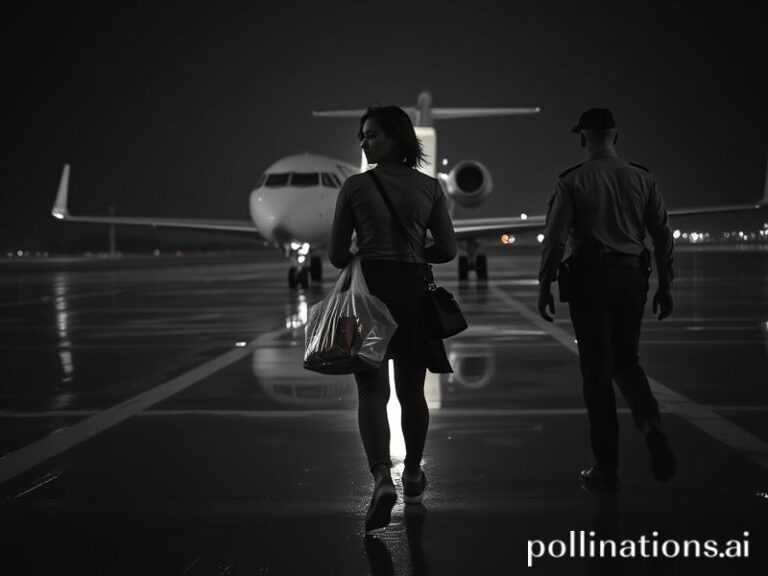martha wainwright
The Ballad of Martha Wainwright, or How One Contralto Became the Soundtrack to a Planet Unraveling
The first time Martha Wainwright’s voice reached Ulaanbaatar, it arrived via a bootleg cassette smuggled in a yak-wool sock. The customs agent who confiscated it was later found weeping in a yurt, clutching the tape like contraband absolution. That, dear reader, is global reach: when a Montreal-born chanteuse can reduce a hardened bureaucrat to existential pulp on the Mongolian steppe.
Of course, the world has always been small for the Wainwrights—an intercontinental dynasty whose dinner-table arguments double as avant-garde performance art. But while half-brother Rufus was busy turning Shakespearean sonnets into haute-couture lullabies for European aristocrats, Martha was out in the metaphorical rain, composing elegies for a civilization that keeps forgetting its own address. Her latest album, “Love Will Be Reborn,” is ostensibly about divorce. In 2024, divorce is what entire nations are filing for—Brexit, Brexit-but-French, and the slow-motion trial separation between Silicon Valley and reality. Coincidence? Please. The woman sings “I Will Internalize” and suddenly the yen drops against the dollar.
Let us zoom out, satellite-style. From Lagos to Lima, Spotify algorithms have quietly crowned Martha the patron saint of disillusioned insomniacs. In Seoul, her voice leaks from late-night taxis where drivers debate whether her cover of “Tower of Song” is an improvement on Leonard Cohen or an act of geopolitical aggression. In Athens, anarchists blast “Bloody Mother Fucking Asshole” outside parliament, proving that profanity is the last universal language once the IMF confiscates your verbs. Meanwhile, in Davos, a hedge-fund oracle claims her vibrato predicts cryptocurrency dips with 73% accuracy—because nothing says “future of finance” like a woman wailing about lousy fathers over minor-key piano.
The irony, naturally, is that Martha never asked to be a geopolitical weather vane. She just wanted to sing about private heartbreak in peace, preferably somewhere with decent wine and no Wi-Fi. Instead, she became the elevator music for late capitalism’s free-fall. Every track is now a Rorschach test for whatever fresh apocalypse is trending: “Far Away” for climate refugees, “When the Day Is Short” for nuclear winter, “Proserpina” for when Mother Earth finally serves the divorce papers. The UN briefly considered adopting “I Know You’re Married But I’ve Got Feelings Too” as the official anthem for diplomatic incidents, then remembered they have no sense of humor.
Yet there is something perversely hopeful here, the way a hangover promises you survived the night. At a recent Paris concert—held in a deconsecrated church because where else?—Martha paused mid-set to note that the stained-glass windows depicted saints who’d been decapitated for singing the wrong hymn. The crowd laughed, because what else can you do when history rhymes that aggressively? Then she launched into “Leave Behind,” and half the audience discreetly googled Portuguese residency requirements. The other half just cried into €14 glasses of Côtes du Rhône, which is French for “we’re all going to die but at least the tannins are complex.”
So what does it mean that a singer-songwriter from a family that makes the Borgias look functional has become the background score to our collective unraveling? Perhaps that we have finally reached the stage of grief where we want our dirges catchy. Or that in an era when borders are rebuilt nightly on cable news, the human voice—cracked, defiant, unapologetically off-key—is the last contraband that still fits in a carry-on.
The cassette from Ulaanbaatar, by the way, is now in the Museum of Post-Geographic Heartbreak, next to a Brexit bus and a vial of Elon Musk’s tears. The yak-wool sock was auctioned to a tech bro who uses it as a cryptocurrency wallet. Martha, meanwhile, is reportedly working on a lullaby for the last coral reef, tentatively titled “Sorry About the Plastic.” It’ll probably go platinum in Antarctica, right before the ice does.
And somewhere, a customs agent hums the chorus, wondering if forgiveness is a tariff we can still afford.







